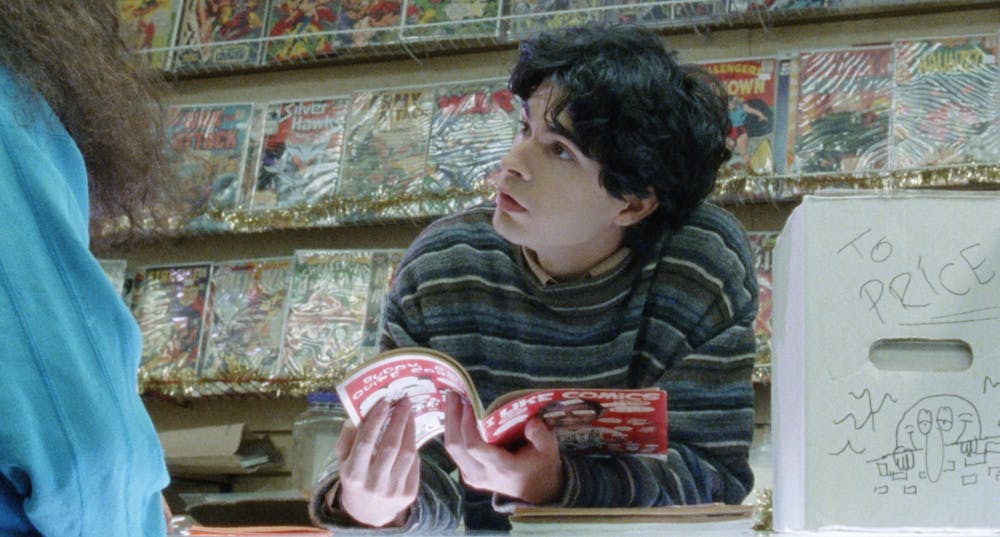One could argue that established artistic rules and conventions only exist so that we may praise works that break or subvert them; in the opening scene to writer-director Owen Kline’s debut “Funny Pages,” we see our fresh-faced protagonist Robert (Daniel Zolghardi) receive this exact lesson from art teacher Mr. Katano (Stephen Adly Guirgis). It seems Kline was an astute student of his own fictional teacher’s teaching, presenting us with a delightfully subversive and dark take on the coming-of-age tale.
The film, released in the U.S. on Aug. 26, follows Zolghardi’s Robert as he rejects the neatly mapped-out, upper-middle class suburban life that his parents have planned for him, instead choosing to make his own way in the world as a cartoonist. He eventually comes into contact with his reluctant teacher in the form of Wallace (Matthew Maher), a seasoned cartoonist-turned-nihilist toward the industry and the world around him.
Zolghardi makes easy work of the dynamic and heady task set forth for him in the lead role; Robert’s almost uninterruptible optimism and naiveté bleeds through the screen, with Zolghardi only ever applying pressure while demonstrating Robert’s grating and more mean-spirited side. Robert is never entirely likable, but he’s entirely human — Zolghardi is largely to thank for that.
Kline’s deft and often absurd script manages to pick up some leg work as well in constructing a world chock-full of characters who come off in equal parts innately human and caricature-like on the screen. The world we’re in never feels quite real, but neither does the real world; Kline’s dirty mirror provides a remarkably clear reflection.
The entire cast — particularly Maher’s Wallace and Miles Emmanuel as Miles — has a firm grasp on the world Kline is attempting to simultaneously construct and deconstruct. Kline ensures that, even with a phenomenally brisk 86-minute runtime, we can sit down and laugh at the absurdity of everything going on while leaving enough room to reflect on issues of class and mental health.
Going back to subversion, the film is certainly in the coming-of-age genre, but instead of rehashing the same old panels, Kline takes time to color outside of the lines to draw us a picture of a story that never wants to see Robert succeed. While there is still an echo of a classic coming-of-age ending — going back to one’s parent’s house and seeing the fault of their adolescent ways — it never feels like a success. The world consistently rejects Robert in one way or another. By the end, it still doesn’t feel like he’s been fully accepted.
The film’s visuals greatly help to demonstrate these themes of subversion and not fitting in. Handled dually by Sean Price Williams and Hunter Zimny, the images on screen feel as if they are about to burst beyond the frame — the 16 mm film colors blend into one another, creating a distinctly indie, yet fitting aesthetic. Williams’ distinct blend of tight framing and shaky cam rears its head here as it has in his collaborations with Josh and Benny Safdie on films like “Good Time” and “Uncut Gems.”
And it’s no surprise to see so many Safdie brother affiliates associated with this project; the brother’s produced the film alongside frequent collaborators Ronald Bronstien and Elara Pictures, as well as small cameo-like roles for the likes of Buddy Duress (“Heaven Knows What,” “Good Time”) and Mitchell Wenig (“Uncut Gems”). It wouldn’t be an unfair guess to go as far as to say the Safdie Brother’s might have directed the film early in their career, given how perfectly it would fit in with their oeuvre.
The film certainly isn’t an easy watch; much like the comics Mr. Katano shows Robert and encourages him to draw at the beginning of the film, it’s meant to be uncomfortable. But it’s in this unease that Kline unfolds something unique and engaging enough to keep you from looking away. As an audience member, Kline asks you to trust the process: at times he may color outside the lines, but in the end, you’ll see he’s made something special.
John Scott is the editor-in-chief at the Daily Lobo. He can be contacted at editorinchief@dailylobo.com or on Twitter @JScott050901
Get content from The Daily Lobo delivered to your inbox






